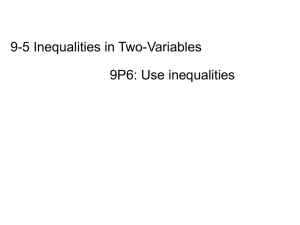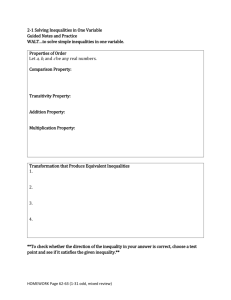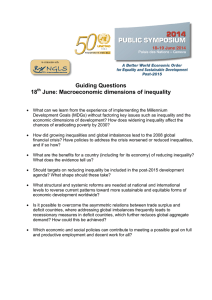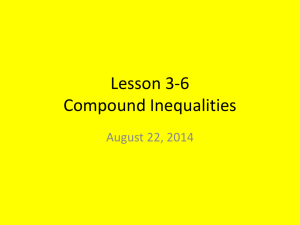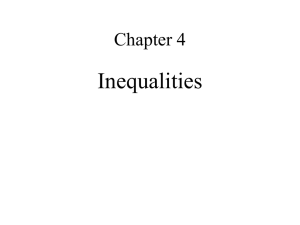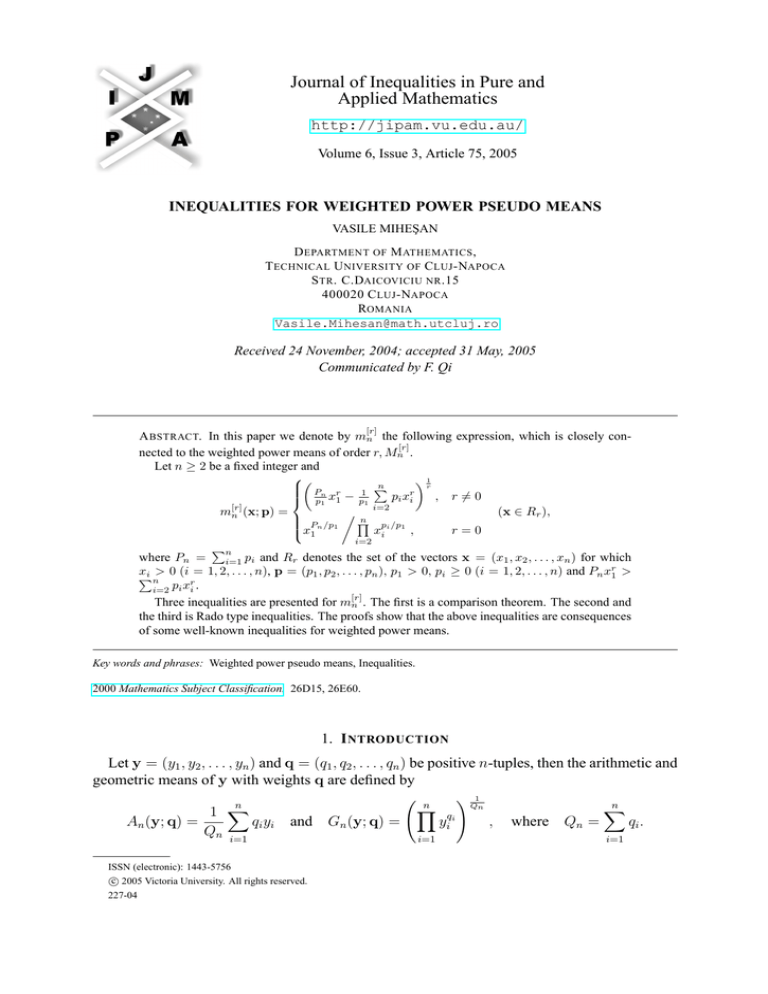
Journal of Inequalities in Pure and
Applied Mathematics
http://jipam.vu.edu.au/
Volume 6, Issue 3, Article 75, 2005
INEQUALITIES FOR WEIGHTED POWER PSEUDO MEANS
VASILE MIHEŞAN
D EPARTMENT OF M ATHEMATICS ,
T ECHNICAL U NIVERSITY OF C LUJ -NAPOCA
S TR . C.DAICOVICIU NR .15
400020 C LUJ -NAPOCA
ROMANIA
Vasile.Mihesan@math.utcluj.ro
Received 24 November, 2004; accepted 31 May, 2005
Communicated by F. Qi
[r]
A BSTRACT. In this paper we denote by mn the following expression, which is closely con[r]
nected to the weighted power means of order r, Mn .
Let n ≥ 2 be a fixed integer and
r1
n
P
Pn r
1
r
x
−
p
x
, r 6= 0
p1 1 p1
i i
[r]
i=2
mn (x; p) =
(x ∈ Rr ),
n
xPn /p1 Q xpi /p1 ,
r=0
1
i=2
i
Pn
where Pn =
i=1 pi and Rr denotes the set of the vectors x = (x1 , x2 , . . . , xn ) for which
x
>
0
(i
=
1,
2,
. . . , n), p = (p1 , p2 , . . . , pn ), p1 > 0, pi ≥ 0 (i = 1, 2, . . . , n) and Pn xr1 >
Pi n
r
i=2 pi xi .
[r]
Three inequalities are presented for mn . The first is a comparison theorem. The second and
the third is Rado type inequalities. The proofs show that the above inequalities are consequences
of some well-known inequalities for weighted power means.
Key words and phrases: Weighted power pseudo means, Inequalities.
2000 Mathematics Subject Classification. 26D15, 26E60.
1. I NTRODUCTION
Let y = (y1 , y2 , . . . , yn ) and q = (q1 , q2 , . . . , qn ) be positive n-tuples, then the arithmetic and
geometric means of y with weights q are defined by
! Q1
n
n
n
n
Y
X
1 X
An (y; q) =
qi yi and Gn (y; q) =
yiqi
, where Qn =
qi .
Qn i=1
i=1
i=1
ISSN (electronic): 1443-5756
c 2005 Victoria University. All rights reserved.
227-04
2
VASILE M IHE ŞAN
[r]
If r is a real number, then the r-th power means of y with weights q, Mn (y; q) is defined
by
(1.1)
r1
n
P
1
qi yir
, r=
6 0;
Qn
i=1
[r]
Mn (y; q) = Q1
n
n
Q
qi
yi
,
r = 0.
i=1
If r, s ∈ R, r ≤ s then [11]
Mn[r] (y; q) ≤ Mn[s] (y, q)
(1.2)
is valid for all positive real numbers yi and qi (i = 1, 2, . . . , n). For r = 0 and s = 1 we obtain
the clasical inequality between the weighted arithmetic and geometric means
n
n
Y
1 X
qi /Qn
≤
(1.3)
Gn = Gn (y; q) =
yi
qi yi = An (y, q) = An .
Qn i=1
i=1
[r]
In this paper we denote by mn (y; q) the following expression which is closely connected to
[r]
Mn (y; q).
Let n ≥ 2 be an integer (considered fixed throughout the paper) and define
r1
n
P
Pn r
1
r
pi xi
, r 6= 0
p1 x1 − p1
[r]
i=2
(1.4)
mn (x; p) =
(x ∈ Rr )
n
Q pi /p1
Pn /p1
x
,
r=0
x
1
i
i=2
P
where Pn = ni=1 pi and Rr denotes the set of the vectors x = (x1 , x2 , . . . , xn ) for which
P xi > 0
(i = 1, 2, . . . , n), p = (p1 , p2 , . . . , pn ), p1 > 0, pi ≥ 0 (i = 2, 3, . . . , n) and Pn xr1 > ni=2 pi xri .
Although there is no general agreement in literature about what constitutes a mean value most
[r]
authors consider the intermediate property as the main feature. Since mn (x; p) do not satisfy
this condition, this means that the double inequalities
min xi ≤ m[r]
n (x; p) ≤ max xi
1≤i≤n
1≤i≤n
[r]
are not true for all positive xi , we call mn the weighted power pseudo means of order r.
For r = 1 we obtain by (1.4) the pseudo arithmetic means an (x, p) for r = 0 the pseudo
geometric means, gn (x, p), see [2]. In 1990, H. Alzer [2] published the following companion
of inequality (1.3):
an (x; p) ≤ gn (x; p).
(1.5)
For the special case p1 = p2 = · · · = pn the inequality (1.5) was proved by S. Iwamoto, R.J.
Tomkins and C.L. Wang [6].
Rado and Popoviciu type inequalities for pseudo arithmetic and geometric means were given
in [2], [9], [10].
We note that inequality (1.5) is an example of a so called reverse inequality. One of the first
reverse inequalities was published by J. Aczél [1] who proved the following intriguing variant
of the Cauchy-Schwarz inequality:
P
P
If xi and yi (i = 1, 2, . . . , n) are real numbers with x21 > ni=2 x2i and y12 > ni=2 yi2 , then
!2
!
!
n
n
n
X
X
X
(1.6)
x1 y1 −
xi yi
≥ x21 −
x2i
y12 −
yi2 .
i=2
J. Inequal. Pure and Appl. Math., 6(3) Art. 75, 2005
i=2
i=2
http://jipam.vu.edu.au/
I NEQUALITIES FOR W EIGHTED P OWER P SEUDO M EANS
3
Further interesting reverse inequalities were given in [3], [5], [6], [7], [8], [11], [12].
The aim of this paper is to prove a comparison theorem and Rado type inequalities for the
weighted power pseudo means.
2. C OMPARISON T HEOREM
Our first result is a comparison theorem for the weighted power pseudo means.
Theorem 2.1. If 0 ≤ r ≤ s, x ∈ Rs then x ∈ Rr and
[r]
m[s]
n (x,p) ≤ mn (x,p).
(2.1)
If r ≤ s ≤ 0, x ∈ Rr then x ∈ Rs and
[r]
m[s]
n (x;p) ≤ mn (x;p).
(2.2)
[r]
[s]
If r < 0 < s then Rr ∩ Rs = ∅, hence mn (x,p), mn (x,p) cannot both be defined, they are not
comparable.
[s]
Proof. To prove (2.1) let a = mn (x, p) > 0, then we obtain by (1.4) and (1.2)
P
P
1 1
p1 as + ni=2 pi xsi s
p1 ar + ni=2 pi xri r
≥
,
x1 =
Pn
Pn
hence
Pn
pi xri
Pn r
x1 − i=2
≥ ar > 0
p1
p1
which shows that x ∈ Rr . Taking the r th root, we obtain (2.1).
[r]
To prove (2.2) let b = mn (x, p) > 0, then we obtain by (1.4) and (1.2),
r Pn
1 s Pn
1
p1 b + i=2 pi xri r
p1 b + i=2 pi xbi s
x1 =
≤
.
Pn
Pn
Hence
xs1
≥
p 1 bs +
Pn
i=2
pi xsi
Pn
and
Pn
pi xsi
Pn s
x1 − i=2
≥ bs > 0,
p1
p1
which shows that x ∈ Rs . Taking the (−s) th root, we obtain (2.2).
If r < 0 < s we infer for n = 2, p1 = p2 that x1 , x2 > 0, xr1 > xr2 , xs1 > xs2 hence x1 < x2
and x1 > x2 , which is impossible.
3. R ADO T YPE I NEQUALITIES FOR W EIGHTED P OWER P SEUDO M EANS
The well-known extension of the arithmetic mean-geometric mean inequality (1.3) is the
following inequality of Rado [11]:
(3.1)
Qn (An (y; q) − Gn (y; q)) ≥ Qn−1 (An−1 (y; q) − Gn−1 (y; q)).
The next proposition provides an analog of the Rado inequality (3.1) for pseudo arithmetic and
geometric means [2].
Proposition 3.1. For all positive real numbers xi (i = 1, 2, . . . , n; n ≥ 2) we have
(3.2)
gn (x,p) − an (x;p) ≥ gn−1 (x;p) − an−1 (x;p).
J. Inequal. Pure and Appl. Math., 6(3) Art. 75, 2005
http://jipam.vu.edu.au/
4
VASILE M IHE ŞAN
The most obvious extension is to allow the means in the Rado inequality to have different
weights [4]
qn
qn
Qn An (y; q) − Pn Gn (y; p) ≥ Qn−1 An−1 (y; q) − Pn−1 Gn−1 (y; p).
pn
pn
Using this inequality we obtain the following generalization of the inequality (3.2) [10].
Proposition 3.2. For all positive real numbers xi (i = 1, 2, . . . , n; n ≥ 2) we have
(3.3)
gn (x;p) − an (x;q) ≥ gn−1 (x;p) − an−1 (x;q).
An extension of the Rado inequality for weighted power means is the following inequality
[4]: If r, s, t ∈ R such that r/t ≤ 1 and s/t ≥ 1 then
t t t
t [s]
[r]
[s]
[r]
(3.4) Pn Mn (y; p) − Mn (y; p)
≥ Pn−1
Mn−1 (y; p) − Mn−1 (y, p)
.
Using inequality (3.4) we obtain generalizations of the inequality of Rado type (3.2) for the
weighted power pseudo means.
Theorem 3.3. If r ≤ 1, x ∈ Rr and xr1 ≤ xrn then
(3.5)
[r]
m[r]
n (x,p) − an (x,p) ≥ mn−1 (x,p) − an−1 (x,p).
If s ≥ 1, x ∈ Rs and x1 ≤ xn then
(3.6)
[s]
an (x,p) − m[s]
n (x,p) ≥ an−1 (x,p) − mn−1 (x,p).
Proof. To prove (3.5) we put in (3.4) s = t = 1 and we obtain for r ≤ 1 the inequality:
[r]
[r]
(3.7)
Pn An (y; p) − Mn (y; p) ≥ Pn−1 An−1 (y; p) − Mn−1 (y; p) .
[r]
If we set in (3.7) y1 = mn (x, p), yi = xi (i = 2, 3, . . . , n) then we have:
Pn An (y; p) − Mn[r] (y; p) = p1 m[r]
n (x; p) − an (x; p) ,
which leads to inequality (3.5). We observe that for r ≤ 1, x ∈ Rr and xr1 ≤ xrn we have
0 < Pn xr1 −
n
X
pi xri ≤ Pn−1 xr1 −
n−1
X
i=2
pi xri
i=2
[r]
mn−1 (x, p)
and
exist.
To prove (3.6) we set in (3.4) r = t = 1 and we obtain for s ≥ 1 the inequality
[s]
(3.8)
Pn Mn(s) (y; p) − An (y; p) ≥ Pn−1 Mn−1 (y; p) − An−1 (y; p) .
[s]
If we put in (3.8) y1 = mn (x, p), yi = xi (i = 2, 3, . . . , n) then we have
Pn Mn[s] (y; p) − An (y; p) = p1 an (x; p) − m[s]
(x;
p)
,
n
[s]
which leads to inequality (3.6). For s ≥ 1, x ∈ Rs and x1 ≤ xn , mn−1 (x; p) exist.
Theorem 3.4. If 0 < r ≤ s, x ∈ Rs and x1 ≤ xn then
s s
s [r]
s
[s]
[s]
(x;p)
≥
m
(x;p)
(x;p)
−
m
−
m
(x;p)
(3.9)
m[r]
n−1
n−1
n
n
and
(3.10)
r
m[r]
(x;p)
n
−
r
m[s]
(x;p)
n
J. Inequal. Pure and Appl. Math., 6(3) Art. 75, 2005
≥
r
[s]
mn−1 (x;p)
−
r
[s]
mn−1 (x;p)
.
http://jipam.vu.edu.au/
I NEQUALITIES FOR W EIGHTED P OWER P SEUDO M EANS
5
Proof. To prove (3.9) we put in (3.4) t = s and we obtain for 0 < r ≤ s the inequality
s s s s
[s]
[r]
[r]
[s]
≥ Pn−1 Mn−1 (y, p) − Mn−1 (y, p)
.
(3.11) Pn Mn (y; p) − Mn (y; p)
[r]
If we set in (3.11) y1 = mn (x; p), yi = xi (i = 2, 3, . . . , n) then we have
s
s s s
[s]
(x;
p)
,
= p1 m[r]
(x;
p)
−
m
Pn Mn[s] (y; p) − Mn[r] (y; p)
n
n
which leads to inequality (3.9) If 0 < r ≤ s, x ∈ Rs then x ∈ Rr and if x1 ≤ xn then
[r]
mn−1 (x; p) exists.
To prove (3.10) we set in (3.4) t = r and we obtain for 0 < r ≤ s the inequality
r r r
r [r]
[s]
(3.12) Pn Mn[s] (y; p) − Mn[r] (y; p)
.
≥ Pn−1 Mn−1 (y; p) − Mn−1 (y; p)
[s]
If we put in (3.12) y1 = mn (x, p)yi = xi (i = 2, 3, . . . , n) then we have
r
r
r [s]
Pn Mn[s] (y; p) − Mn[r] (y; p)r = p1 m[r]
(x;
p)
−
m
(x;
p)
,
n
n
which leads to inequality (3.10).
R EFERENCES
[1] J. ACZÉL, Some general methods in the theory of functional equations in one variable.New applications of functional equations (Russian), Uspehi Mat. Nauk (N.S.), 11(3) (69) (1956), 3–58.
[2] H. ALZER, Inequalities for pseudo arithmetic and geometric means, International Series of Numerical Mathematics, Vol. 103, Birkhauser-Verlag Basel, 1992, 5–16.
[3] R. BELLMAN, On an inequality concerning an indefinite form, Amer. Math. Monthly, 63 (1956),
108–109.
[4] P.S. BULLEN, D.S. MITRINOVIĆ AND P.M. VASIĆ, Means and Their Inequalities, Reidel Publ.
Co., Dordrecht, 1988.
[5] Y.J. CHO, M. MATIĆ AND J. PEČARIĆ, Improvements of some inequalities of Aczél’s type, J.
Math. Anal. Appl., 256 (2001), 226–240.
[6] S. IWAMOTO, R.J. TOMKINS AND C.L. WANG, Some theorems on reverse inequalities, J. Math.
Anal. Appl., 119 (1986), 282–299.
[7] L. LOSONCZI, Inequalities for indefinite forms, J. Math. Anal. Appl., 285 (1997),148–156.
[8] V. MIHEŞAN, Applications of continuous dynamic programing to inverse inequalities, General
Mathematics, 2(1994), 53–60.
[9] V. MIHEŞAN, Popoviciu type inequalities for pseudo arithmetic and geometric means, (in press)
[10] V. MIHEŞAN, Rado and Popoviciu type inequalities for pseudo arithmetic and geometric means,
(in press)
[11] D.S. MITRINOVIĆ, Analytic Inequalities, Springer Verlag, New York, 1970.
[12] X.H. SUN, Aczél-Chebyshev type inequality for positive linear functional, J. Math. Anal. Appl.,
245 (2000), 393–403.
J. Inequal. Pure and Appl. Math., 6(3) Art. 75, 2005
http://jipam.vu.edu.au/

